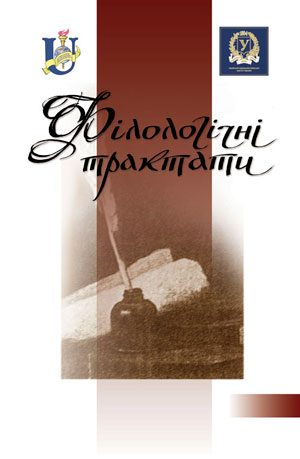LANGUAGE TRANSFORMATIONS OF “ENEIDA” BY IVAN KOTLIAREVSKII IN THE 1798th AND 1980th EDITIONS
Keywords:
spelling, lexical unit, de-euphemization, etymological analysis, syntactic norms.Abstract
The issue of restoring the authenticity of the Ukrainian language is timely even during the war in Ukraine, because, as it turned out, language itself is a powerful identifier of national belonging. The first significant step towards was the project of the new Ukrainian spelling (orthography) of 2019, which launched the process of reviving Ukrainian language norms at the phonetic, lexical, and grammatical levels. In this context, the analysis of ancient works written by Ukrainian authors before the Ukrainophobic decrees aims to restore the lost, to determine the ways of returning the long-forgotten, the expediency of using it in the modern language, which is extremely relevant today. Unfortunately, for many decades, the spelling norms of the Ukrainian language were adapted to the language of the state, which established not linguistic, but political rules. That is why even the existing spellings of the Ukrainian language of the 20th century cannot be recognized as proper Ukrainian. Therefore, the linguistic analysis of authentic texts in the Ukrainian language, those publications that were not "censored" by the state machine and contained a living language inherent to its speakers, is gaining great importance. The burlesque-travesty poem “Eneida” by Ivan Kotliarevskii, written at the end of the 18th - beginning of the 19th century, is an example of the use of the colloquial Ukrainian language of that time, which is fully presented in the work. Of course, the development of a language at any stage has its own characteristics, so one cannot easily and thoughtlessly copy today what was inherent in the language in the XVIII-XIX centuries; it is important to find the authenticity of the language (at its various levels), which will be logically and correctly recorded in modern standards.References
Енеида на малороссійській языкъ перелицїованная И. Котляревськимъ. Съ дозволєнія Санктпетербургской Цензуры. Иждивенїемъ М.Парпуры. В СанктпетербургѢ, 1798 года. Любителямъ марососсійскаго слова усерднѢйше посвящаєтся.
Етимологічний словник української мови. Ред. кол.: О.С. Мельничук (гол. ред.), В.Т. Коломієць, Т.Б. Лукінова, Г.П. Півторак, В.Г. Скляренко, О.Б. Ткаченко; Укладачі: Г. П. Півторак, О.Д. Пономарів, І.A. Стоянов, О.Б. Ткаченко, A.M. Шамота. НАН України. Ін-т мовознавства ім. О.О. Потебні. Київ. Наукова думка. Т. 1-6. 1982-2012.
Жила Світлана. Рецепція «Енеїди» Івана Котляревського: інтерпретація Валерія Шевчука. URL: http://erpub.chnpu.edu.ua:8080.pdf (дата звернення: 23.10.2022)
Казачий словарь-справочник. Сан. Ансельмо, Калифорния, С.Ш.А. Составитель словаря Г.В. Губарев, редактор-издатель А.И. Скрылов. 1966-1970 https://kazak.academic.ru (дата звернення: 26.10.2022)
Котляревський І.П. Твори. Київ. ВХЛ «Дніпро». 1980. 311с.
Кралюк Петро. Іван Котляревський кинув виклик Російський імперії. Його творчість актуальна і в нинішній війні. URL: https://www.radiosvoboda.org/a/30225416.html (дата звернення: 03.10.2022)
Євген Нахлік. Перелицьований світ Івана Котляревського: текст-інтертекст-контекст. Національна академія наук України. ДУ «Інститут Івана Франка». Серія «Літературознавчі студії». Випуск 21. Львів. 2015. 543с.
Словник української мови. В 11-ти т. Київ. Наукова думка. 1970 - 1980.
ключових подій української історії. Вихід «Енеїди» І. Котляревського. URL: https://uahistory.co/book/100-key-events-of-ukrainian-history/55.php (дата звернення: 27.10.2022)














